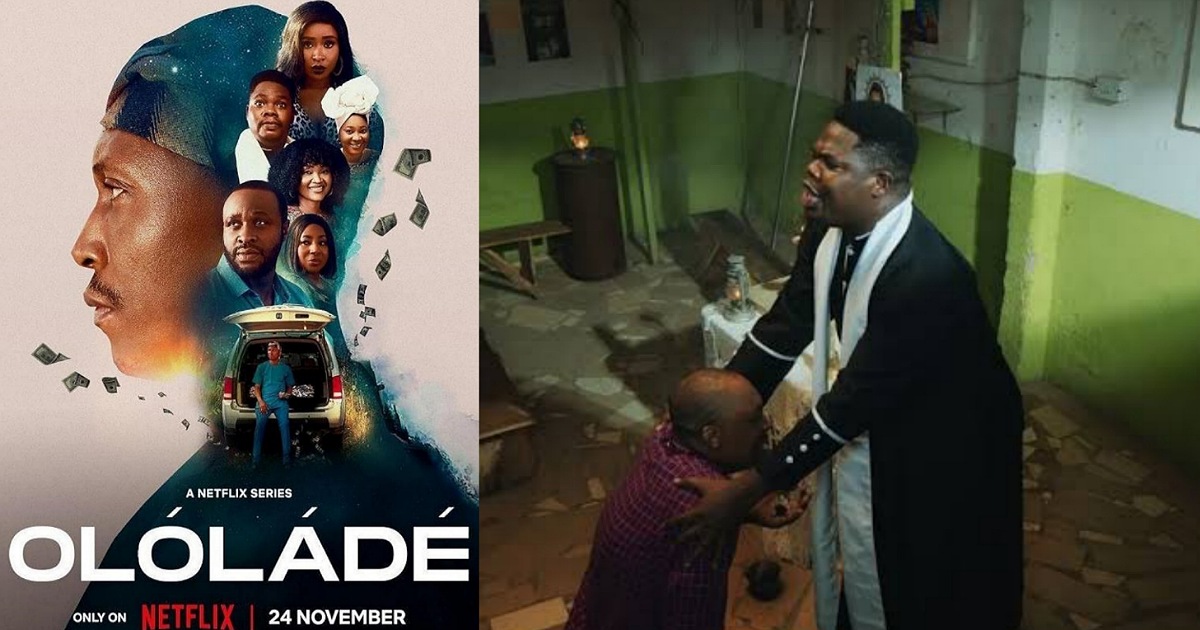“Ololade” is a six-part drama series that chronicles the story of two poor friends (in the literal sense) who coincidentally become stupendously rich. The series is produced by TCN Africa, a production company founded by Olawale Adetula, Gbemi Olateru-Olagbegi, and Daniel Aideyan in 2021. The production company has since produced ‘A Little Black Book’ and ‘My Name is A-zed.’ ‘Ololade,’ the company’s latest IP, is said to pay homage to classic Yoruba movies of pure entertainment and amusement with little or no distractions. And if, like me, you grew up watching Yoruba movies at home, this particular series should evoke a sense of nostalgia and recall to your memory the two-part film of ‘Ololade Mr. Money’ featuring Ebun Oloyede, popularly known as Olaiye Igwe. The movie threads the Old Nollywood theme of money ritual and its consequences, borrowing from Judeo-Christian morality, beliefs, and ethos. The premise in this series is totally different, as it twists and turns.
‘Ololade’ is the story of two pals, Shina and Lateef. Shina (Kunle Idowu, famously known as Frank Donga) is a school teacher who believes he’s destined to be wealthy, but that unseen metaphysical forces hinder him from achieving his “glorious” destiny, until Alagba (Debo Adewale), a crooked pastor, prays for him for the return of his glorious destiny. Some minutes later, he receives a bank alert of 50 million naira, a sign he interprets as the entire return of his glorious destiny, and so he suddenly becomes a nouveau-riche.
On the other hand, Lateef (Femi Adebayo) is a part-time auto-mechanic and a full-time gigolo and wencher. During libertine activity, his favourite hobby, he’s caught by his sugar-mummy, Iyabo, alias Big Mummy (Mercy Aigbe), who starts fighting Laide, Lateef’s side chick, who accidentally trips and dies on the spot. To cover up, both Lateef and Big Mummy decide to bury the dead body in an unmarked grave. And Big Mummy, Iyabo, resolves to end their relationship together by compensating Lateef with a sum of 20 million naira. And just like that, Lateef is transformed into a nouveau riche.
And, of course, nothing lasts forever; neither freshly obtained riches nor social mobility, at least not for free. Lateef is upset by Laide’s ghostly visits, and the state in which he sees Laide’s parents wrenches and eats his soul. And Shina and his family are threatened when the owner of the 50 million naira transferred into account, the Black Lions, shows up asking their money, of which only seven million remain. Shina is also attacked at home by three women: Sade (Mide Martins), his legal wife, Amaka (Liz da Silva), his concubine, and Bose (Damilola Oni), a rural girl brought from the village as a wife who will provide Shina with the needed male heir.
‘Ololade’ is a movie riddled with logical incoherence. It’s a movie that asks for the suspension of logic in order to consume gratifying entertainment content. And, while the film is overall enjoyable, a critical atomistic inspection reveals that it is little more than a jumble of inconsistencies.
“Ololade” is a clumsy and shoddy family drama filled with unresolved tensions and roadblocks. A family drama that consistently fails to deliver. The speech in the film is monotonously puerile and dull. Even in its anti-climatic climax, the film could have used crisp editing to offer the audience a sense of denouement or closure, but instead, we have loose ends.
Movies are so strong that we often cheer for the anti-hero or villain to prevail in the end. The tale being told and the depth of the characters provide the power in role characterization. In Ololade, we have ‘torn characters’ who are neither good nor wicked. This in-between, the inability to place the characters at either extreme pole, is what makes them mostly forgettable characters. I was only rooting for Sade till the film provided us unneeded information (secrets) about her and then ended, making me lose interest in that only character I was rooting for.
I particularly enjoy one moment in the film, which demonstrates the director’s technical ability. Shina goes to the bank to get money for his wife in the scene. He meets Ihotu (Debby Felix) there. Shina tries to charm her while a romantic soundtrack plays in the background. As Ihotu is nothing more than a dangerous lady with powerful bosses, the moment is a red herring, an almost structural irony foreshadowing what is to come.
“Ololade,” despite its shortcomings, is an enjoyable family drama with resonant themes of secrecy and envy. The film will undoubtedly be highly appreciated by Yoruba Nollywood fans, as it covers typical tropes and genres for this population.
Rating: 5/10



















